Ready, steady, SLOW! The wonderfully eccentric (and very British) world of competitive snail racing
Summer in the British countryside brings with it all sorts of unusual events and celebrations – and they don't get any more eccentric than the World Snail Racing Championships. James Fisher and his thoroughbred mollusc Pablo headed to Congham in Norfolk to take part.

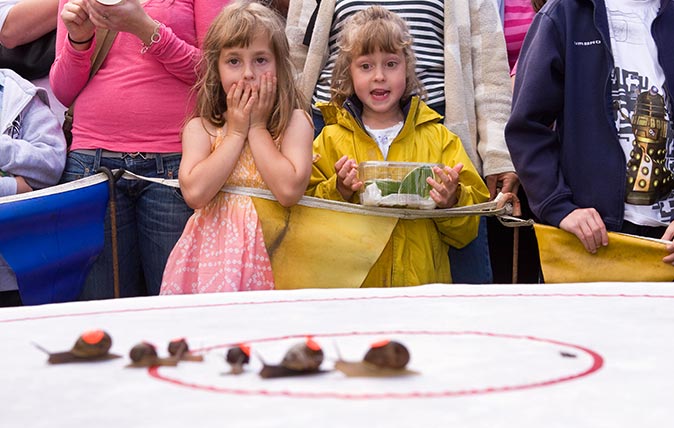
Exquisite houses, the beauty of Nature, and how to get the most from your life, straight to your inbox.
You are now subscribed
Your newsletter sign-up was successful
I’d found Pablo a few nights previously. Rather, my mother had found Pablo, savaging her plants, a few nights previously. She admitted on the phone that my request was an odd one. ‘You’re doing what? Watching snails? In Norfolk?’
I could sense mild despair in her voice. Five years of private school and three at university for this, a commission covering the World Snail Racing Championships in Congham. I get the feeling she was hoping for an accountant or a doctor, but life works in funny ways.
I’d heard about the championships almost a year previously, when I read a story about the humble Larry of Castle Acre, who was plucked from a leaf the night before 2017’s event and promptly romped home with the title. I, like most Britons, am enraptured by a Cinderella story and here was a prime example. I was also intrigued about the event itself. I’d heard of the concept of snail racing, but my knowledge of it was nothing more than an acknowledgement of its existence – like Andorra or the Liberal Democrats.
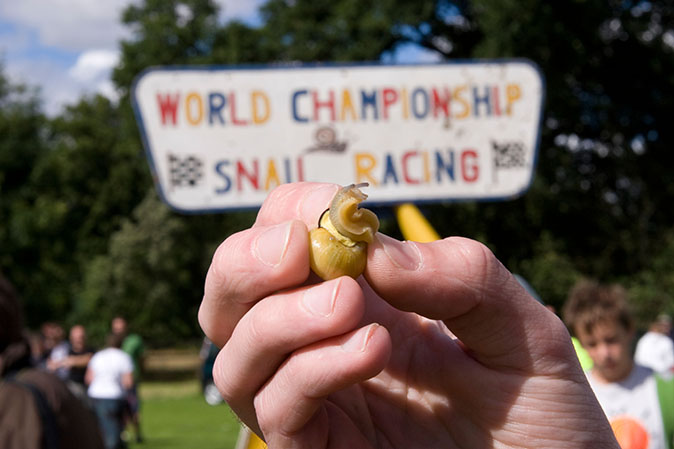
As I dug deeper, I became intrigued not only about the racing itself, but about how the pinnacle of a sport (even if that endeavour is watching snails slither at speed. Spoiler: they don’t) ended up on a table top in the middle of a Norfolk village fête. I had to find out.
I arrived just in time for the initial heat, the first of 11 that preceded the final, whereupon a new champion would be crowned. I got slightly lost trying to find the venue, so had to stop and ask for direct-ions. I’d expected my question of ‘Excuse me, but where can I watch the World Snail Racing Championships?’ to be greeted with swift admission into the nearest mental institution, but, instead, I was greeted with a smile and a coherent path to my destination.
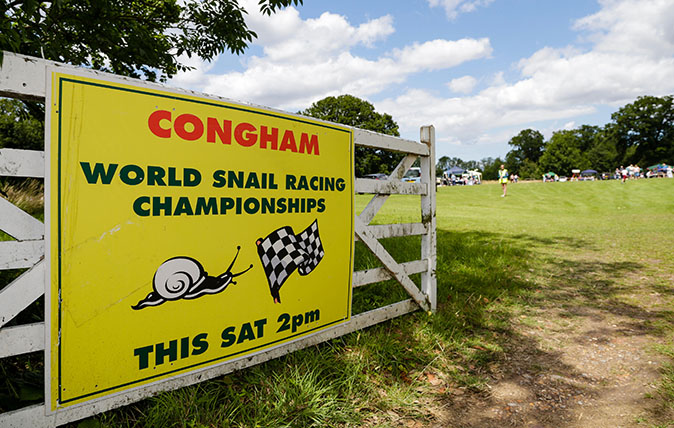
Earlier in the morning, I’d scooped up Pablo from his ‘stable’, placing him gently in a small box on the front seat, and he looked supremely comfortable. After the journey, he was less so, having been flung against the window during a particularly sharp piece of manoeuvring to avoid a suicidal hedgehog. Frustratingly, Pablo retreated into his shell and refused to come out, so I left him to stew in his own juices and decided to enter him into a later race.
Taking place in the middle of the village cricket ground, the Congham fête was a delicious mixture of the old and the new. Whack the Rat, the local scout group and a raffle were dovetailing nicely with the cultural juggernaut that’s taking over our countryside, the uke orchestra. After listening to a quick rendition of Sex on Fire, which was particularly well received by members of the local church, I sought out Neil Riseborough, one of the championship’s organisers. It didn’t take long, as he stood out regally, bedecked in a pure-white polo shirt with ‘Snail Master’ emblazoned on the back.
Exquisite houses, the beauty of Nature, and how to get the most from your life, straight to your inbox.
‘I’m worried about three things,’ he told me with a focused glare. ‘Shell burn, dehydration and hallucination – and that’s just me! Ha!’ He erupted with the hearty laughter of a man who’d finally delivered a joke that he’d been storing up for weeks.
However, I understood his point; no shade and 30˚C of British summer was likely to take its toll on competitor and spectator alike. The first of the heats began and I settled in to watch.
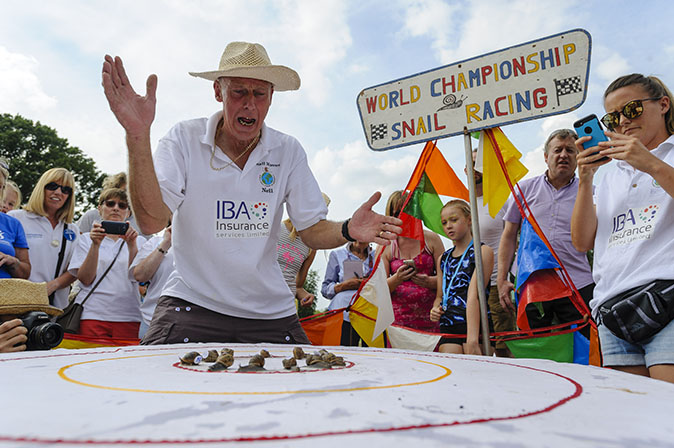
I’ll be honest: there’s not a terrific amount of drama in watching snails slowly drag themselves across 13in of damp tablecloth. The course is a circle, with the snails lined up in the middle and pointing outwards. The rules are simple: there aren’t any, other than the first snail to cross the finish line, which is located on the edge of the table, wins. Each race begins with a guttural cry of ‘Ready, steady, slow!’ from Neil, after which, the ‘action’ commences.
The oppressive temperature made the three minutes of racing particularly dry, as various competitors simply refused to emerge from the cool confines of their shells. Heat three was particularly passive, with a winner not being declared for at least 15 minutes after the race had started – there’s a reason that snail racing isn’t competing for live coverage with football, cricket and rugby.
I roused Pablo from his slumber and decided to enter him into heat five. I was feeling rather confident – I’d been watching him during his morning exercise and thought he was a clear favourite. He was energetic, aggressive and, most of all, quick. Considering what I’d seen in the previous heats, he should have had no trouble in rushing past the 18 other snails he’d be lining up against.
My arrogance proved fatal as, once on the starting line, Pablo took one look at the track, his competitors and the blazing sun and promptly reversed into his shell. He came last and was immediately sold to the local French restaurant as punishment.
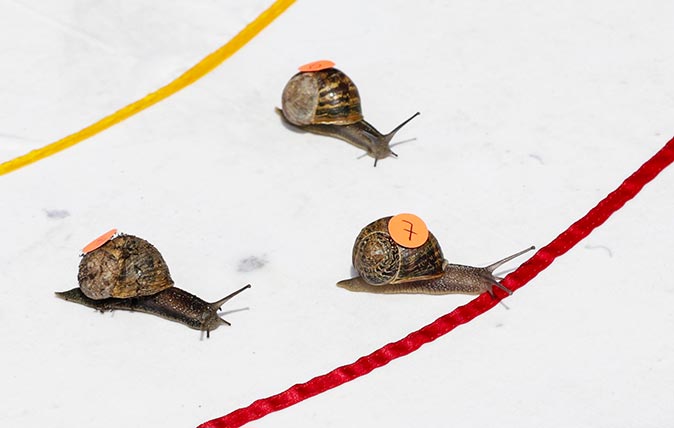
The final consisted of the winners of each of the 11 heats and was likely the finest race of the afternoon. After three minutes of intense competition, Hosta was declared the victor and the new world champion. Owner Jo Waterfield was thrilled, as was Hosta, especially as Jo had told me that she’d ‘squash him if he didn’t win’. Hosta was named after the very plant he’d spent the best part of the summer devouring and, despite being apprehended, he’d managed to buy himself freedom with his sprinting skills.
With that, the fête drifted to a close and villagers, some with faces painted like tigers and some still clutching their unlucky snails, wandered off to the local pub or back home.
It’s not a week at work without a press release or a news story declaring the end of village life. They’re ghost towns, we’re told, rural society lost to poor broadband, lack of housing, lack of post offices and lack of interest. Whether that’s true or not, there’s one thing that’s worth taking away from Congham and the World Snail Racing Championships and it’s the importance of village life and community – they are the threads in the fabric of the countryside.
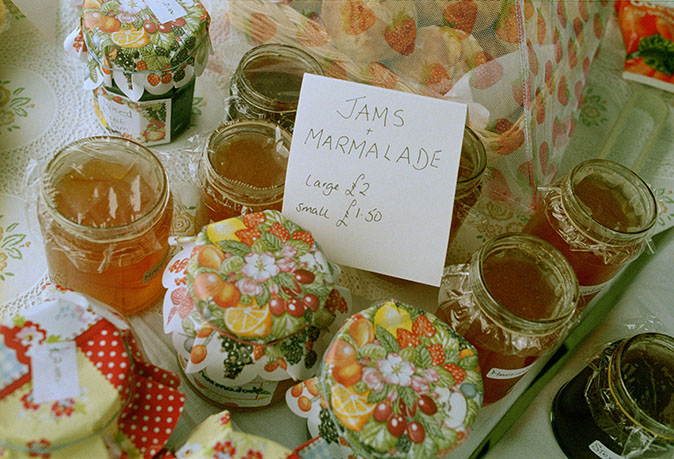
You could see it in the enthusiasm of Neil, you could see it in the faces of the young children who’d brought their snails from all over East Anglia and painted their shells with love and care and you could feel it in the atmosphere of the whole day: here was a small Norfolk neighbourhood that gleefully places itself on the map and fixes its church roof in the process. Communities such as this don’t exist in London or the Soho Farmhouse and, like Larry and Hosta, they’re underdogs and deserve to be celebrated by all of us.
Congham and the World Snail Racing Championships are a timely reminder of what it is about the English countryside that makes it so special: its inhabitants and irrepressible eccentricities.
Think you can do better than James? Of course you do. See www.snailracing.net for details of how to get involved.

Credit: Paul Roberts/Picfair
50 great things to do in Britain that won't cost you a penny
From moonlight to museums, birdsong to the Old Bailey, Kate Green and Giles Kime find 50 gloriously free things to
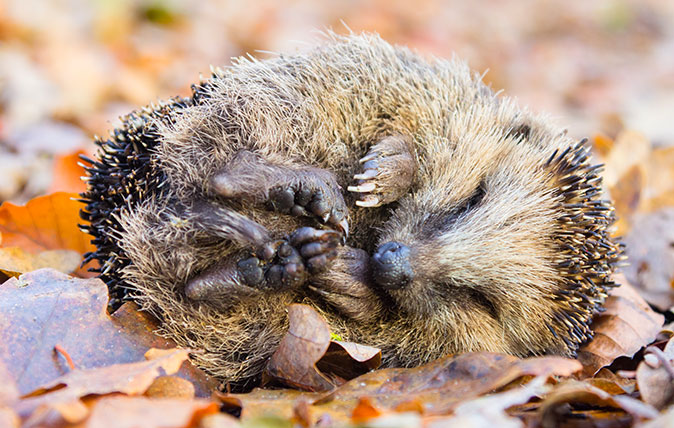
Credit: Getty
Hedgehogs in peril: Time to do your bit to help save Mrs Tiggywinkle
It's time to do your bit to check up on Britain's declining hedgehog population, as Annunicata Elwes reports.

50 things Britain gave the world, from apologies to zoos
Throughout the centuries, Britain has led the world in all that is civilised, from culture to condiments and fast horses

James Fisher is the Digital Commissioning Editor of Country Life. He writes about motoring, travel and things that upset him. He lives in London. He wants to publish good stories, so you should email him.